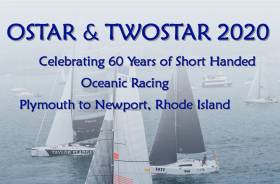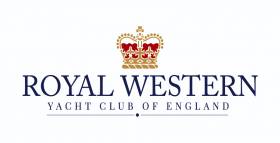Displaying items by tag: Royal Western Yacht Club of England
Plymouth Race Week Returns in 2024 With Three Championship Events
Thursday 11 July 2024 will see the welcome return of Plymouth Race Week.
There will be three great events happening simultaneously during the four-day regatta taking place over three racecourses in Plymouth Sound National Marine Park on the south-west coast of England.
Hosted by the Royal Western Yacht Club of England, the week is guaranteed to have a strong local turnout as the race committee will be regional and national race officers from a number of the local clubs.
Racecourse A will host the IRC Southwest Championships. As with all racing over the week, this is an open event which will run from committee boat starts and managed by the RWYC.
Within the IRC class will be breakout results for RC1000 and RC900, two local initiatives which have seen some great racing over the past two years.
Following a lunchtime briefing, IRC racing will begin on Thursday afternoon with two races, followed by a maximum of four races on Friday and Saturday and finally two on Sunday.
Racecourse B will be from the Plym Yacht Club start line on the Mount Batten Breakwater and will host the SW YTC Southwest Championships.
 Map of the planned racecourses for Plymouth Race Week 2024
Map of the planned racecourses for Plymouth Race Week 2024
Race 1 will be the traditional Chris Moyse Pursuit Race, followed by round-the-cans racing on Saturday and Sunday.
Racecourse C will be south of the Breakwater and the venue for the J24 National Championships. A large entry is expected for this competitive one-design class as their World Championships in 2025 are to be held here under the burgees of both the Saltash Sailing Club and Plym Yacht Club.
Known as “The Yachtsman’s Regatta”, Plymouth Race Week is unique. The Breakwater provides excellent shelter against big seas so the conditions will be the very best available anywhere. That coupled with the natural amphitheatre, being the Plymouth Sound National Marine Park, provides the best spectator vantage points in order to watch the action close up.
It is no surprise that Plymouth Sound has hosted both SailGP and America’s Cup World Series events in recent years. Now, Plymouth Race Week allows the opportunity for all visiting teams to experience racing in those same waters as seen on TV.
A full entertainment package is scheduled for the event, to include a roast, live music, barbecue, wet bar and of course a crew party — with the prize-giving on the Sunday afternoon where the J24 National Champion will be crowned along with the SW YTC and IRC Southwest champions.
For further details and entry forms, see the RWYC website. And for the latest chat and information, see the event’s official social media page.
OSTAR & TWOSTAR To Remain In Plymouth, RWYC Confirms
Plymouth’s Royal Western Yacht Club has confirmed that it will run its OSTAR and TWOSTAR transatlantic races in 2020 from Britain’s Ocean City as it has done every four years since the first race in 1960.
“These races from Plymouth to Newport, Rhode Island will continue to be sailed as originally envisaged by Cockleshell hero Blondie Hasler, a test of skipper and boat against the North Atlantic Ocean,” said the club, which will next year celebrate 60 years since it introduced short-handed oceanic racing.
The OSTAR and TWOSTAR events will also be supported by Plymouth City Council as part of next year’s Mayflower 400 celebrations.
“Unfortunately the French organisers of The Transat 2020 have now decided to start their race in Brest rather than Plymouth,” the Plymouth club added. “This deprives the skippers and public of the opportunity to meet and share in the 60th anniversary of the OSTAR.”
The RWYC explained that The Transat was first sailed in 2004 when it decided it could no longer afford the cost or responsibility of running a ‘Grand Prix’ type event for the larger, one-design, highly sponsored and professionally skippered boats.
“The RWYC selected a commercial events organisation to run this part of the race while they continued to run the OSTAR, for professional and experienced skippers alike sailing any class of boat, as the corinthian event envisaged by the original participants 60 years ago.”
#RB&I - The Royal Western Yacht Club of England is now taking entries for the latest Round Britain and Ireland two-handed race, which starts from Plymouth on Sunday 3 June.
This year marks the 14th running of the quadrennial yacht race, which was established in 1966 by the Cockershell hero Major Blondie Hasler.
The race comprises five legs totalling around 2,000 miles, sailed clockwise around the British Isles and Ireland leaving all islands and rocks to starboard.
The race is open to professional and amateur yachtsmen in mono and multi-hulls from 28ft to 55ft overall.
The Round Britain and Ireland race is essentially five races in one with the results decided on accumulated time (IRC corrected). The legs are relatively short stages of three or four days where time spent at the helm and minimum sleep has to be balanced with the need for solo watch keeping and precise navigation.
The race record stands at 15 days, 7 hours but sailors should allow about 23 days to complete the event, including the four 48-hour stopovers in Kinsale, Castle Bay, Lerwick and Lowestoft.
The first leg from Plymouth to Kinsale is 230 miles long, passing outside the Eddystone and Bishop Rock lights to finish at Bulman Rock. Kinsale Yacht Club is at the head of the accessible and safe harbour.
After the 48-hour stopover, competitors set sail on the second leg from Kinsale for Castle Bay on the island of Barra in the Outer Hebrides. The boats keep the Fastnet Rock to starboard at the beginning of the 440-mile second leg past the South and West coasts of Ireland. On arrival, the fleet moors or anchors in Castle Bay.
Leg three covers a distance of 420 miles. The yachts round Barra Head and sail north northwest 70 miles out into the Atlantic, aiming for the isolated volcanic archipelago of St Kilda, after which the competitors round Muckle Flugga and head to Lerwick, 61 degrees north latitude, on the island of Shetland. The Lerwick Boating Club is the host for two days of jollity and warm hospitality.
The longest leg four is 470 miles south from Lerwick to Lowestoft, which is the most easterly point of the British Isles. The Royal Norfolk and Suffolk Yacht Club provides a very hospitable stopover. Family and friends find this port the most convenient to visit being the most accessible by land.
The final leg five of 305 miles is along the South Coast to Plymouth. This leg often proves to be where the podium places are decided due to the many tidal gates. The finish line is in Plymouth Sound off the RWYC Club House.
The Notice of Race and Entry Form can be found at the RWYC website. For further details, contact the race director David Searle at [email protected] or the RWYC secretariat at [email protected].
As reported earlier today on Afloat.ie, entries are also open for the Volvo Round Ireland Yacht Race 2018, marking the 40th year of the biennial race run by Wicklow Sailing Club.
Meanwhile, the RORC has posted its Pre Notice of Race for the Sevenstar Round Britain and Ireland Race run from Cowes on Sunday 12 August. The previous edition in 2014 was won by Irish duo Liam Coyne and Brian Flahive and their First 36.7 Lula Belle.

























































